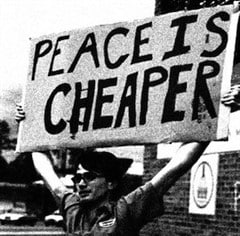
The deaths, injuries, and property destruction of battles are obvious costs of war as is all the money spent on weapons, soldiers, and other expenses directly related to battles. Less well understood by many people are the many other war costs, including costs imposed on people who may never be near a battlefield but just live in a nation at war.
RPI Academic Board Member Robert Higgs explores in an informative Ludwig von Mises Institute lecture on Thursday many of these often overlooked or misunderstood costs. Higgs addresses a number of war costs the US government has historically imposed, including:
- increased national debt,
- increased and new taxes,
- inflation,
- rigged capital markets,
- price controls,
- government and government contractors having priority on the delivery of resources,
- substitution of the production of war goods for the production of other goods,
- condemnation of land for government-preferred use,
- nationalization of industries,
- deportations,
- massive propaganda efforts,
- prohibition on workers striking,
- conscription into the military,
- bulked-up police,
- expanded spying, and
- cracking down on resistance including through restrictions on the exercise of rights to free speech, assembly, the press, and petitioning the government for redress of grievances.
Many Americans may look to the US Supreme Court in hopes that it will stop some or all of these expansions of government power. Higgs, though, warns against placing faith in the court. He notes that his examination of the Supreme Court’s cases during the two world wars in his book Crisis and Leviathan concludes that “in every case of any consequence [the Supreme Court] ruled in favor of the government’s actions however unconstitutional on the face of them they were.”
At a particularly compelling moment in the lecture Higgs asks for consideration of James Madison’s statement that, “No nation could preserve its freedom in the midst of continual warfare.” Higgs then comments:
And now consider that the United States has been at war almost without interruption in one way or another since 1940. That’s 74 years. That’s my entire lifetime and then some, a time in which the United States has in some way—hot, cold, limited, all-out—in some way been at war. And I would certainly maintain that one consequence of this sustained warfare has been a diminution of our liberties in vitally important ways.
Watch the complete one hour lecture here:
